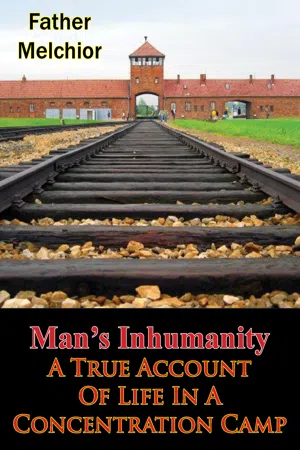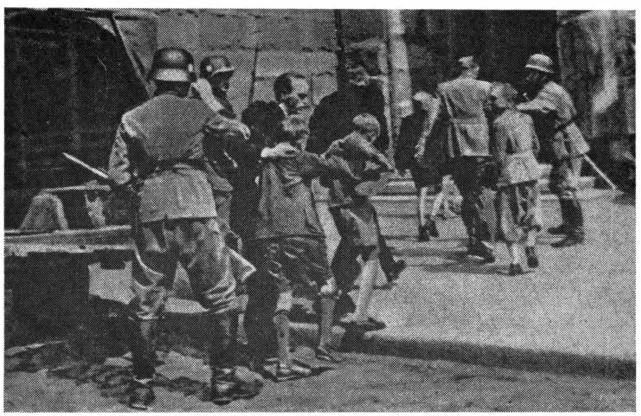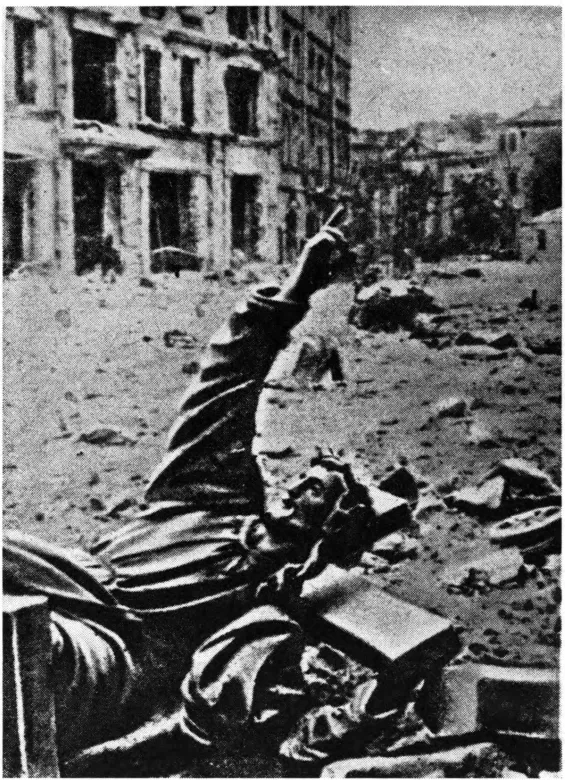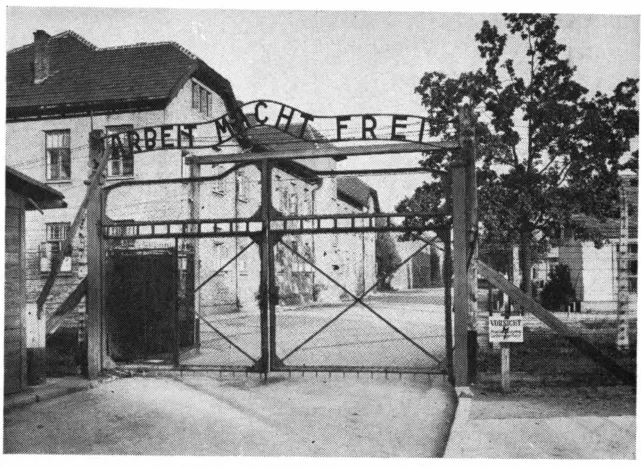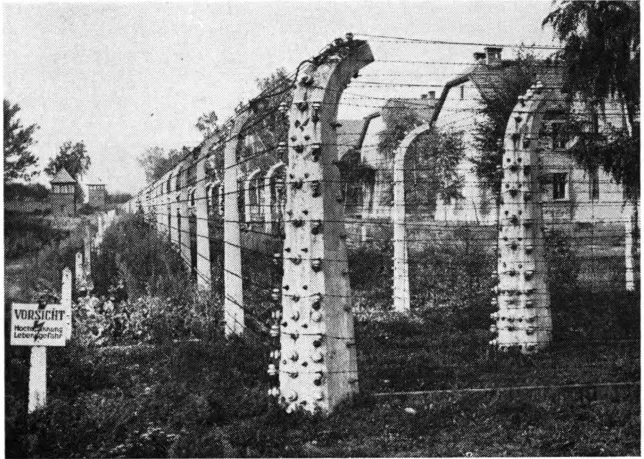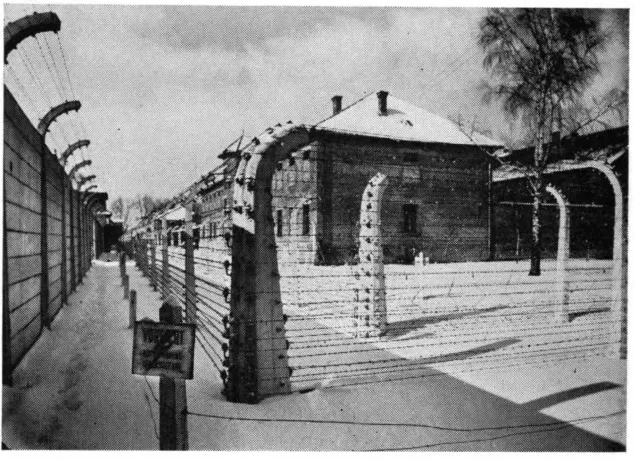![]()
LIBERATION?
In 1942 the prison of Sieradz was crammed to capacity. In three blocks, where there was space for only 600 men, 4,000 prisoners had to live together. Small cells intended for five people had 52 tenants. Food was becoming scarce. Many prisoners developed dropsy, others became tubercular. One day when we felt hopeless and doomed, the guards announced a new regulation. Orders had come from Berlin. All prisoners who had been sentenced to more than three years would be liberated immediately. They would finish their sentence after the war was over. Lack of space—don’t you know. Prisoners cannot become a burden to the Almighty State …
The news spread like fire. Some prisoners would not believe it, others went wild with joyful expectation.
When the first group was “liberated” a few days later, some doubts were expressed by those who saw them handed over to a detachment of German policemen, who escorted them to the railway station.
“Where did they go? Somewhere, to be sure …”
Another convoy was organized the following week. Every prisoner had an identification card with the following information: “Released from the prison of … on the … Handed over to the Gestapo”.
Many prisoners objected to leaving the prison, but they had no choice.
Convoys left Sieradz and Lodz, Warsaw and Cracow. Thousands of men and women were released and sent “somewhere” in special trains. We learned later that German SS-men were rounding up hundreds of men in restaurants, in stores, in churches and in the streets. Many had been dragged during the night from their homes. They were taken prisoner and led away in their nightclothes.
Street raid in Warsaw. Thousands have been thus imprisoned and sent to concentration camps. Photo by on underground tighter.
I learned subsequently that a stream of trucks and cars was proceeding in the direction of the concentration camps of Majdanek, Oswiecim, Dachau and Sachsenhausen. When my turn came I did not know where my journey would end, but I remember that I prayed to God not to be sent to Oswiecim.
* * *
On January 15, 1943, 628 of us waited in the prison yard for the departure signal. One hundred armed policemen surrounded us and one of them shouted angrily: “The first man who makes a move will be shot”.
It was 8 P.M. when the gates of the prison opened with a screeching noise.
* * *
The Germans liked to do their evil work during the night.
The night became their accomplice. It was the best time for every kind of evil: executions, searching parties, rounding up of innocent victims. After curfew when a Pole was not allowed to be in the streets, gangs of young Hitlerites desecrated small chapels and wayside shrines. They broke the beautiful wooden crosses on the highways and in the market places. During the night, too, they carried away their spoils and transported looted treasures.
It was a starless night when they arrested me in Sanok. Our Franciscan monastery and the church in Kalisz were searched by German policemen after midnight. Four brothers and one priest kidnapped by SS-men died later in a concentration camp.
Statue of Christ, brutally cast upon the street by the Germans, still points to Heaven.
In the prison of Kalisz, twice at 3 A.M. we heard a roll call of prisoners sentenced to death.
On one night a group of helpless victims was loaded in a van and sent to the woods. I will never forget that terrible night. I remember some of the names: Maksymilian Niewiadomski, two lay brothers Ciesielski, Joseph Szymanski … A witness who was later released told me how they were ordered to kneel down in front of a ditch, and were shot in the back of the head.
Main gate at the Oswiecim horror camp. Note inscription.
In Kalisz, Father Pawlowski was publicly executed on the Square of Liberty. Such shows were unusual; the Germans preferred to do their work behind the black curtain of the night.
It was also during the night that the prisoners were questioned by Gestapo torturers. During my short stay in the Cracow prison of Monteluppi I met a young girl, a student of a Cracow college. A Gestapo man was doing his best to make her betray her friends. He was courteous and kind while he tempted her with a promise of special privileges. The girl was adamant. She would not answer any questions. Just as I entered the room one of the agents of the Gestapo made an insulting remark. I had my Franciscan habit on me. He grabbed my cord and my rosary and jeered: “You could use them as a noose. The cord is strong enough.”
The girl could not stand it, she burst into tears. One of the men took a white chalk and drew a cross on my back, another German called a guard and ordered him to escort me to the railway station …
All these memories are still haunting me and I often get lost in day dreaming about the horrible past.
Barbed wire charge with high powered electricity encircled the camp at Oswiecim.
All concentration camps were surrounded by electric wires.
It was during a stormy night that I was “released” from the prison of Sieradz. We were a crowd of 628 men escorted by armed policemen.
In spite of the darkness I noticed the ghastly pallor of my frightened colleagues. When we boarded the train, no one knew where we were going. A few hours later someone whispered in my ear: “We just passed Lodz. The train is going to the East”.
“For Heaven’s sake, can it be that we are being sent to Oswiecim?”
Oswiecim, or Auschwitz, won the doubtful honor of being THE horror camp and its name alone had an ominous portent.
We did not sleep. We did not feel like talking, surrounded by armed guards who paced the cars all the time.
“Are you a priest?” I heard a voice coming from nowhere. Startled I turned my head. A German guard was standing behind me.
“Yes, I am.”
“Did you say Mass today?” he inquired. He stared at me intently and then, without waiting for a reply, quickly went away.
I never saw him again, but I do not doubt that he was at heart tired and disgusted. He did not have the courage to rebel, but he had enough decency to send to me a small package of tobacco through another prisoner.
Section of the concentration camp at Oswiecim—Auschwitz.
The train stopped for a few minutes at Czestochowa, the Polish Lourdes. At dawn we saw the tall chimneys of Silesian iron works. The stations now had strange German names, distorted translations of historic Polish names.
The dreaded word AUSCHWITZ appeared on posters and on walls. The train was now running on a new side track. It stopped abruptly.
I gasped. It was Auschwitz.
In this flat country a ghost town made of barracks seemed to rise from the soil. It was Brzezinki-Birkenau an annex of the ill-famed Oswiecim (Auschwitz) camp.
Memories of days gone by come back to me. I was a boy of seventeen. I had just graduated from high school and m...
